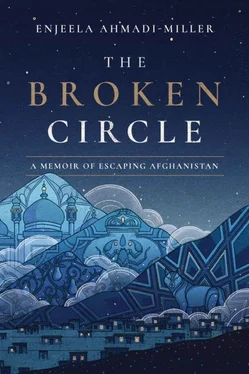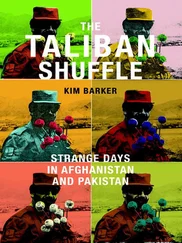“I had to leave with nothing.”
“Do you think we’ll ever go home?” I asked him.
His dark eyes grew sad for a moment. “If the war ends soon, we can return. But who knows how long it will go on. First, we have to travel to New Delhi to join your mother and Shapairi, Ahmad Shah, and Vida. Then we can decide what to do from there.”
“Are we going to live in India if we can’t go home?” Laila asked.
“No,” he said, very emphatically. “We will go to America.”
We were all silently shocked, staring at each other in surprise.
“America!” Laila said, smiling broadly. We’d heard of America from all of Padar’s friends from the American embassy. Many American diplomats and businessmen had visited our home on Shura Street. We thought of America as a paradise, a place with freedom and safety to be yourself. A model of what Afghanistan could have become if the democratic reforms had not been stopped by the Parcham.
“That’s why we’re going to Islamabad,” he said. “My friend there works for the American embassy. I know he’ll be able to help us.”
We ate with renewed excitement, hardly tasting the food because we were chattering so much about leaving Peshawar and getting back on the road. America. The idea kept rolling around in my mind. It didn’t seem real to me; neither did seeing Mommy. Padar spoke of going to New Delhi to see her as a matter of fact—it was not a hope or a dream, but a certainty. That night, I sat on the bed considering what it would be like seeing Mommy after so many years. Padar moved around the room, agile and sober and ever so helpful as we packed our clothes for the trip to see his friend. The room was filled with joy, but I could not see Mommy’s face. I had this creeping fear that as warm and caring as Padar had been toward us the last few days, Mommy would be his exact opposite—cold, uncaring, and not interested in my life.
We rose well before dawn and dressed in our new clothes. Salman stood behind the desk as we checked out. He had been so nice to me, helping me through a dark time of my life. I wanted to go behind the desk like usual, give him a hug, and thank him for looking after me. My real father had shown up and taken the place Salman had filled so wonderfully for months. He had been a surrogate father, helping me to endure my loneliness, encouraging me to believe my future would be brighter than the dreary moments I lived through in his hotel. I felt like I was cheating him out of a daughter’s love by walking out of the hotel with my real padar. I wanted to embrace him one last time and thank him. I was grateful for his kindness but afraid of offending Padar. Just before we left the lobby, holding tightly on to Padar’s hand, I turned and waved at him. He smiled in return. Regretfully, I didn’t leave him with any words of thanks, only my eternal gratitude for his willingness to befriend a hapless and nearly orphaned child.

The train ride to Islamabad was mostly quiet. Padar didn’t ask us too much about our journey. I wanted to tell him about Mina and the scorpions and so much more, but I felt he didn’t want to hear it. None of us talked much about what we’d been through, but we made sure Padar knew Masood had taken very good care of us the entire way.
About halfway there, he relaxed and leaned back. “I had planned on leaving sooner, but they had me under constant surveillance.” He had been followed night and day, after work, and watched at night. They had suspected he wanted to leave, so they had warned him against it. “The war now is everywhere. It’s getting much more difficult to escape.”
In the weeks leading up to his leaving, he had been under constant pressure. The Russians had tried to intimidate him to cooperate with their spying schemes. He had to escape Kabul through a complicated route to finally meet up with Masood. Once outside Kabul, he’d followed the same route we had, but he’d been delayed in one village for quite a long time when the fighting caught up with him. He had many close calls with the army along the way.
As soon as we disembarked in Islamabad with our luggage, his friend Dawar was waiting for us on the station platform. He and Padar hugged, kissing cheeks as close friends did. We all greeted him with a polite salaam, our hands folded prayerfully, heads bowed in respect.
He drove us to his home—a beautiful, white, two-story house on a lovely, tree-lined street. His elegant Pakistani wife made us dinner, and we sat around his large table to eat. It reminded me so much of home in Afghanistan, but I was not comforted. The beautiful table with all the lavish food made me feel odd. Eating such delicious food when there were so many people with so little to eat, people I knew by name, whose faces I could see clearly in my mind, seemed wrong. I set my fork down; my discomfort was so overwhelming. My body was here, sitting at this beautiful dining table, but my soul couldn’t forget the country we had just traversed. I couldn’t get thoughts of Mina out of my mind, and the freedom fighters struggling for their lives in the freezing mountains.
We stayed at Padar’s friend’s home for several months while Padar worked on obtaining our passports. He went to the American embassy nearly every day to meet with different people. Many days he came home quite frustrated that he wasn’t getting the help he needed to obtain identity documents and passports. But he stayed determined to do what he needed to do so we could travel. While he was gone, we kept busy. Since Dawar and his wife had no children, we took over the large living room, playing fis kut and eating lavish meals. The house reminded me of our home in Kabul: warm, loving, and plenty of food.
Though we were living in the diplomatic section of the Pakistani capital, Padar did not want us to go outside. Only after Laila and I kept questioning, he told us that he was probably being watched. He feared the Russians knew where he was, and as soon as he went to the Embassy of Afghanistan to apply for a passport, they would know for certain. His friends in the American embassy were trying to assist him, but he had run into bureaucratic roadblocks. One night in the living room of the gracious home, he unburdened himself after a particularly disappointing day. All four of us sat on the sofa while he took a chair across from us.
“They keep a list,” he said, referring to the Afghan administration of Babrak Karmal, the new president the Russians had installed to lead the puppet government. “Enemies of the state are kidnapped and sent back or just killed.”
“Why would they want you back in Afghanistan?” Laila asked.
“They think I know how the Americans are planning to help the mujahideen,” he said.
“Do you?” I asked.
He clenched his jaw. “Even if I knew what President Reagan was thinking at this very moment”—he punched his index finger on the coffee table—“I would not tell them anything. But I’m sure they think I know things that are important to them, so they pursue me still.”
Each day after that, when he left, one of us would stand in the large windows of the living room and watch the kids pedaling up and down the street and playing soccer. We wanted to know if someone was following us.
After several months, Padar rented an apartment for us. It was in a nice section of town not far from the diplomatic neighborhood. It had two bedrooms, a living room, a kitchen, and a small balcony. It came completely furnished, with sofas, chairs, a table, and beds that were well used. We were comfortable there. While it wasn’t the home I’d known, we were together as a family in our own home. We were no longer guests in a hotel room or in someone else’s house, and compared to how we had lived during our stays in the villages, this small apartment was luxurious.
Читать дальше













